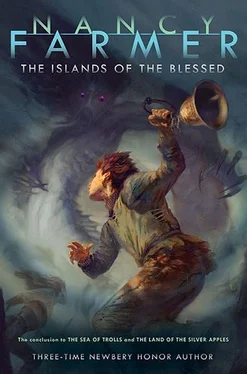The Bard then questioned the cat about Ethne. How was she faring? Did she get enough to eat? Would she like her old father to knock down the wall and carry her off to King Brutus? The cat yowled with mirth. “I know he’s a poor excuse for a husband, but he would cherish her,” the old man said.
Little by little, Jack gleaned the situation as the Bard translated Pangur Ban’s words. Ethne had fallen into a kind of trance. On the one hand, she was grateful to be free of elvish voices. On the other, so little happened that she spent most of the time staring into space. Twice a day food was thrust through the window and refuse taken away. No one spoke to her. She could hear the muffled prayers of the monks and Father Severus’ sermons, but she no longer listened to them.
She prayed when she thought of it. She paced to and fro in the narrow space between the bed and the wall. The rest of the time she slept. Pangur Ban was at his wits’ end trying to find activities for her—there’s only so much petting a cat can endure. He brought her treats from the outside world. He raided the kitchen for pies, fruit, roasted birds…
Pangur Ban licked his lips and glanced at Thorgil.
Of course the monastery was no longer the luxurious place it had been before Father Severus arrived. Half the time the monks lived on bread and water, and self-flagellation was epidemic.
“Self—what?” asked Jack.
“The monks beat themselves with whips,” the Bard said. “It’s supposed to make them virtuous. I’ll never understand Christians.”
Jack found it difficult to understand too. He’d been knocked six ways to Sunday by Father, and all it made him was resentful.
Most important, Pangur Ban brought Ethne fragments of the outside world. He would drag in a vine covered with leaves, or a rose, or a mouthful of acorns. He brought her mice and small birds, and she’d begged him to take them away and free them. Once he brought her a dead mole, and she wept for the pity of it.
“That wasn’t nice,” objected Jack.
“I disagree,” said the Bard. “The worst thing that can happen to Ethne is that she loses her ability to feel. Then she will become all elf and soulless as they are. Sorrow is a part of life.”
“We can’t leave her in that prison,” Thorgil said.
“No, we can’t.” The old man gazed into the distance, going far beyond the monastery, the lake, or even the bright sky beyond. “Unfortunately, we have two problems. I must rescue Ethne, but I must also attend to the draugr. If the draugr emerges before I’ve found a solution, she’ll start killing again.”
They sat and looked down at the monastery. The ponies ambled closer and nudged Thorgil with their noses. Horses always favored Thorgil, Jack thought, even ones who’d never seen her before. Pangur Ban stretched out his long body and appeared to sleep, but the tip of his tail moved ever so slightly. “I’ll have to deal with the draugr first,” the Bard finally decided. “I know Ethne is suffering, but I hope she can endure a while longer. I dare not allow the draugr to emerge.”
He picked forget-me-nots and wove them into a garland. Laying a hand over them, he chanted something in a language Jack didn’t know. But Pangur Ban did. The cat rolled on the ground and purred ecstatically, finally coming to rest at the Bard’s feet. The old man wound the garland around the cat’s neck. “I have called life into these flowers,” he said. “They will not fade for many a day.”
Pangur Ban sped away.
“What language was that, sir?” Jack asked. “You’ve often used it to work magic.”
“It is the speech they use in the Islands of the Blessed,” said the Bard. “I learned it as an apprentice.”
“But Pangur Ban understands it.”
The old man gazed after the cat, who was just then reaching the monastery door. A monk bent down to pet him and received a crisp bite. The cat fled through the door. “Remember my telling you about how dangerous it was to trade places with an animal’s spirit?” the Bard said.
Jack nodded. He remembered how the old man had hidden in the body of a crow and been unable to leave.
“The longer you’re in an animal’s body,” the Bard said, “the more you forget about being human. They didn’t teach the skill at the School of Bards until the final year, and some apprentices never made it out of their animal’s body. Pangur Ban was one.”
“He’s a bard ?” cried Jack.
“A failed one. You have to be very sure of your own identity before attempting such a feat. I always suspected that Pangur preferred being a cat rather than a human. There are no responsibilities and endless chances for fun, and he was always a happy-go-lucky lad.”
“But still… never to be human again.” Jack was appalled. “What happened to his body?”
“It was inhabited by the cat’s spirit and wandered away. To outsiders the cat/lad appeared to be simpleminded, but of course he wasn’t. I heard that he became a rat-catcher in Dublin and was very good at it.”
Thorgil called the ponies, and Jack packed up the remnants of the lunch. He mounted, settling the awkward bundle containing Fair Lamenting before him. “Now comes the hard part,” said the Bard.
As they drew near the monastery, Jack noted the extensive fields and newly planted orchards all around. Monks were busy weeding, setting up trellises, and digging seedbeds. He recognized some of them. They were thinner and better-muscled than before, and it was clear that Father Severus’ discipline had been good for them. The boy also recognized the former criminals by their missing ears and slit noses. These seemed to have been freed from slavery, for they were dressed as monks and were working alongside the others.
Yet the faces were as shifty and brutal as before. The monks had never been much more than thieves, and the criminals had been condemned murderers. Whatever sermons they endured didn’t seem to have reformed them.
“What’s going to happen here, sir, if Father Severus is removed?” Jack said in a low voice.
“An excellent question,” the Bard replied. “I’d hate to see this lot run wild again.”
They were shown into the courtyard Jack remembered from his first visit. It had been repaired after the earthquake, but the fountain barely trickled. Instead of rosebushes and lavender, the yard was covered with gravel, and the pleasant wooden benches had been replaced with cold, hard stone.
“Severus does like his penances,” remarked the Bard, lowering himself carefully.
They waited. The abbot—Father Severus—was meditating, they were informed by a villainous-looking monk with a withered hand. Jack knew the man had endured a trial by ordeal and had been forced to carry a glowing piece of iron for nine feet. When the wound festered, he’d been found guilty.
“His Future Sainthood always spends the afternoon on his knees,” the monk said. “That’s after a good fast in the morning and a light scourge for lunch.”
“What’s a scourge?” Jack said after the man left.
“A special kind of whip,” the Bard said. “It leaves deeper scars.”
Jack felt repelled and disgusted. What kind of madness was going on here? It was impossible to believe that these monks had any kinship with gentle Brother Aiden or St. Cuthbert.
“The Northmen endure pain gladly,” Thorgil said, “yet they do not inflict it on themselves. I see no honor in such wounds.”
“You’re correct there, shield maiden,” said the Bard.
The sun had inclined to the west and shadows had begun to fill the courtyard when Father Severus strode in. He was as thin as ever, but underneath, Jack sensed an iron strength. The boy looked for the kindness he’d seen in the dungeons of the elves and found it missing.
Читать дальше










